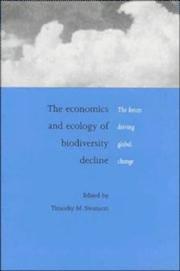| Listing 1 - 10 of 18 | << page >> |
Sort by
|
Article
Abstract | Keywords | Export | Availability | Bookmark
 Loading...
Loading...Choose an application
- Reference Manager
- EndNote
- RefWorks (Direct export to RefWorks)
Article
Abstract | Keywords | Export | Availability | Bookmark
 Loading...
Loading...Choose an application
- Reference Manager
- EndNote
- RefWorks (Direct export to RefWorks)

ISBN: 0521635799 Year: 1998 Publisher: Cambridge Cambridge University Press
Abstract | Keywords | Export | Availability | Bookmark
 Loading...
Loading...Choose an application
- Reference Manager
- EndNote
- RefWorks (Direct export to RefWorks)

ISBN: 1858984866 9781858984865 Year: 1996 Publisher: Cheltenham: Elgar,
Abstract | Keywords | Export | Availability | Bookmark
 Loading...
Loading...Choose an application
- Reference Manager
- EndNote
- RefWorks (Direct export to RefWorks)
Book
ISBN: 1853833533 1853833584 9781853833588 Year: 1997 Publisher: London: Earthscan,
Abstract | Keywords | Export | Availability | Bookmark
 Loading...
Loading...Choose an application
- Reference Manager
- EndNote
- RefWorks (Direct export to RefWorks)

ISBN: 1853831247 Year: 1992 Publisher: London Earthscan
Abstract | Keywords | Export | Availability | Bookmark
 Loading...
Loading...Choose an application
- Reference Manager
- EndNote
- RefWorks (Direct export to RefWorks)
Nature protection --- Economic conditions. Economic development --- Third World: economic development problems --- Animal sauvage --- wild animals --- Plante sauvage --- Wild plants --- Biodiversité --- Biodiversity --- Ressource naturelle --- Natural resources --- Conservation des ressources --- Resource conservation --- Gestion des ressources --- resource management --- Contexte économique --- economic environment --- Politique de l'environnement --- Environmental policies --- Développement durable --- Sustainable development --- Environmental Sciences and Forestry. Nature Management --- Wildlife Conservation and Management --- Wildlife Conservation and Management. --- Developing countries: economic development problems

ISBN: 0521482305 Year: 1995 Publisher: Cambridge New York Cambridge University Press
Abstract | Keywords | Export | Availability | Bookmark
 Loading...
Loading...Choose an application
- Reference Manager
- EndNote
- RefWorks (Direct export to RefWorks)
General ecology and biosociology --- Economics --- Biodiversity conservation --- Biological diversity conservation --- Economic development --- Biodiversité --- Développement économique --- Congresses --- Economic aspects --- Environmental aspects --- Conservation --- Congrès --- Aspect de l'environnement --- Environmental Sciences and Forestry. Nature Management --- Biodiversity --- Biodiversity. --- Biodiversité --- Développement économique --- Congresses. --- Congrès --- Biological diversity conservation - Economic aspects - Congresses. --- ENVIRONMENTAL ECONOMICS --- ECONOMIC DEVELOPMENT --- BIOLOGICAL DIVERSITY --- CONSERVATION

ISBN: 0521471125 0521635802 0511623410 Year: 1995 Publisher: Cambridge : Cambridge University Press,
Abstract | Keywords | Export | Availability | Bookmark
 Loading...
Loading...Choose an application
- Reference Manager
- EndNote
- RefWorks (Direct export to RefWorks)
The urgent need to ensure the conservation of biological diversity is now widely recognised, but practical measures to protect endangered species and habitats are still carried out on a small scale and generally limited to developed countries. This volume provides a detailed analysis of the economic and scientific rationales for biodiversity conservation. It discusses the justification for, and implementation of intellectual property rights regimes as incentive systems to encourage conservation. An interdisciplinary approach is used in the book, encompassing fields of study that include evolutionary biology, chemistry, economics and legal studies. The arguments are presented using the case study of the use of medicinal plants in the pharmaceutical industry. The book will be of interest and relevance to a broad spectrum of conservationists, from research students to policy makers.
Biodiversity conservation. --- Botanical drug industry. --- Intellectual property. --- Medicinal plants. --- Plant diversity conservation. --- CON Bioconservation --- biodiversity --- conservation --- medicinal plants --- Life Sciences --- General and Others --- Drug plants --- Plants, Useful --- Botanical drug industry --- Botany, Medical --- Materia medica, Vegetable --- Psychotropic plants --- Medicinal plant industry --- Vegetable drug industry --- Pharmaceutical industry --- Plant products industry --- Medicinal plants --- Intellectual property --- IP (Intellectual property) --- Proprietary rights --- Rights, Proprietary --- Intangible property --- Conservation of plant diversity --- Plant diversity --- Biodiversity conservation --- Plant conservation --- Biodiversity --- Biological diversity conservation --- Conservation of biodiversity --- Diversity conservation, Biological --- Gender mainstreaming in biodiversity conservation --- Maintenance of biological diversity --- Preservation of biological diversity --- Conservation of natural resources --- Ecosystem management --- Law and legislation --- Conservation

ISBN: 0762308885 1849501572 9786611026677 1281026670 0080545319 9781849501576 9780080545318 9780762308880 Year: 2002 Volume: 20 Publisher: Amsterdam: Elsevier,
Abstract | Keywords | Export | Availability | Bookmark
 Loading...
Loading...Choose an application
- Reference Manager
- EndNote
- RefWorks (Direct export to RefWorks)
An Introduction to the Law and Economics of Environmental Policy emphasises the importance of institutional design in addressing social problems. Three important issues concerning institutional design are: policies, instruments, and enforcement. This volume surveys each of the issues, and emphasises the common themes arising in optimal institutional design. These themes include the cost of complex institutional design, and the role of private institutions attaining social objects. This book will be particularly useful to law schools, departments of government, policy or economics, environmental managers and insurance companies.
614.7 --- 341 --- 341 Internationaal recht. Volkenrecht --(algemeen) --- Internationaal recht. Volkenrecht --(algemeen) --- Pollutie van lucht, water, grond--(openbare gezondheidszorg) --- Hygiene of air, water, soil. Pollution and its control --- Environmental policy --- Environment and state --- Environmental control --- Environmental management --- Environmental protection --- Environmental quality --- State and environment --- Environmental auditing --- Economic aspects. --- Law and legislation. --- Government policy --- Science --- Law --- Social issues & processes. --- Economics. --- Institutional economics. --- History. --- Business & Financial. --- Economics

ISBN: 1280201436 9786610201433 0306476592 1402004990 Year: 2002 Publisher: Boston, Massachusetts : Kluwer Academic Publishers,
Abstract | Keywords | Export | Availability | Bookmark
 Loading...
Loading...Choose an application
- Reference Manager
- EndNote
- RefWorks (Direct export to RefWorks)
The advent of new biotechnologies implies significant changes in the world, both biologically and industrially. Biologically, these new technologies represent changes on a scale never before witnessed in the context of evolutionary systems. How these systems will respond to these changes is uncertain and potentially very significant. The first part of this volume addresses these issues in a series of chapters considering the manner in which societies might analyse and manage these systemic responses to biotechnological changes. The second part of the volume addresses the industrial issues concerning biotechnologies. One of the primary motivations for these changes is to enhance the appropriability of the value of innovation occurring within the life sciences sectors. Changing to a property rights-based system of biotechnology has implications for the nature of research and development within these sectors, and the diffusion and distribution of its benefits across the globe. Another set of chapters in this volume sets out a framework for considering these important industrial issues. The volume is the outcome of a two-year project on the economics of managing biotechnologies in agriculture. It is recommended to academics and policy makers interested in the issues concerning society's options in the management of this process of technological change.
Biotechnology --- Biotechnology industries --- Agricultural biotechnology --- Economic aspects --- Environmental economics. --- Nature conservation. --- Economic growth. --- Agricultural economics. --- Environmental Economics. --- Nature Conservation. --- Economic Growth. --- Agricultural Economics. --- Agrarian question --- Agribusiness --- Agricultural economics --- Agricultural production economics --- Agriculture --- Production economics, Agricultural --- Land use, Rural --- Development, Economic --- Economic growth --- Growth, Economic --- Economic policy --- Economics --- Statics and dynamics (Social sciences) --- Development economics --- Resource curse --- Conservation of nature --- Nature --- Nature protection --- Protection of nature --- Conservation of natural resources --- Applied ecology --- Conservation biology --- Endangered ecosystems --- Natural areas --- Environmental quality --- Conservation --- Environmental aspects --- Agro-biotechnology --- Chemical engineering --- Genetic engineering --- Biomedical industries --- High technology industries
| Listing 1 - 10 of 18 | << page >> |
Sort by
|

 Search
Search Feedback
Feedback About UniCat
About UniCat  Help
Help News
News